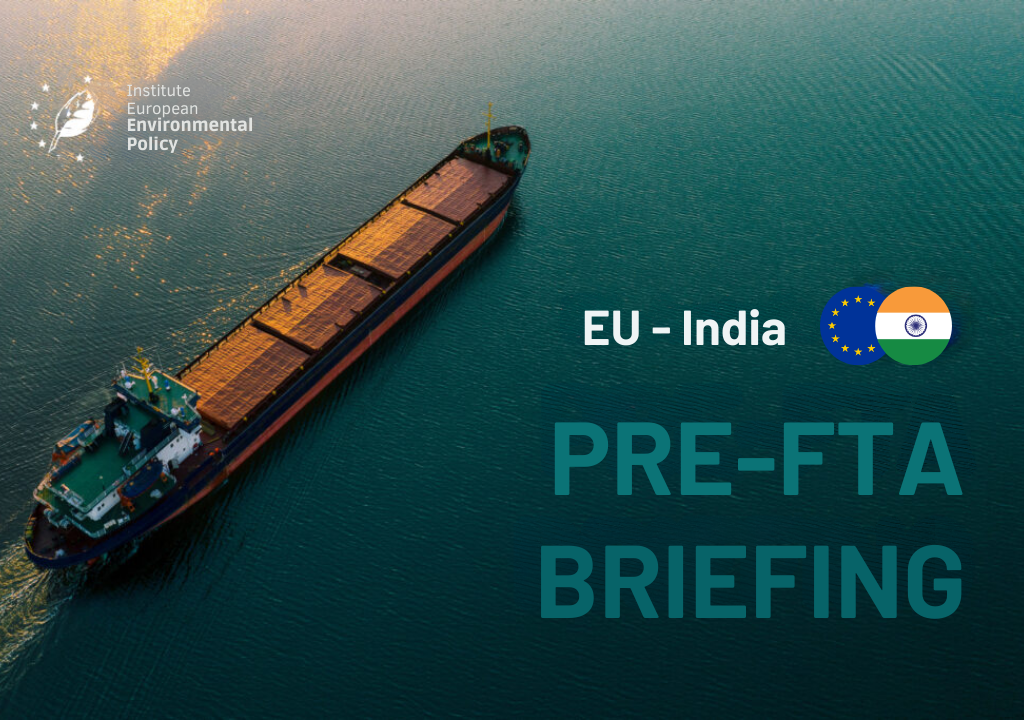Authors: Antoine Oger, Eline Blot, Darragh Cunningham
With the negotiation of the free trade agreement with India, the EU seeks to establish new ties with Indo-Pacific countries to “de-risk” its trade and investment relationships across the globe. The last round of negotiations occurred in February 2024, and the agreement is likely not being concluded before the EU elections.
The EU and India resumed trade talks in the summer of 2022 following seven years of unsuccessful negotiations which eventually stagnated in 2013. This briefing assesses sustainability challenges in India relevant to the FTA and proposes recommendations to further environmental and climate cooperation and progress between the trade partners.
This briefing is part of a new IEEP policy series monitoring upcoming free trade agreements that are either being negotiated or concluded. For more briefings assessing the environmental sustainability of future FTAs, consult this page.
With the negotiation of this FTA, the EU seeks to establish new ties with Indo-Pacific countries to “de-risk” its trade and investment relationships across the globe. Though the duo had high ambitions to conclude the negotiations before the end of 2023, they were unsuccessful, with the last round of negotiations occurred in February 2024, and the agreement likely not being concluded before the EU elections.
India faces several sustainability issues due to its reliance on fossil fuels for energy generation and industrial activities, and its agricultural sector which feeds approximately 18% of the world’s population. In particular, India is one of the largest producing countries of agricultural commodities worldwide with more than half of its territory used as cropland. The country is the largest global producer, consumer and importer of pulses, the largest producer of milk and jute, and the world’s second-largest cattle population of 190 million in 2012. It is the second-largest producer of rice, wheat, sugarcane, cotton, groundnuts, fruits and vegetables.
These environmental pressures are likely to worsen as sectoral activities are expected to expand under the FTA with the EU in combination with less stringent climate and environmental regulations. As a result, India’s greenhouse gas (GHG) emissions, including CO2 and agriculture-related emissions are expected to rise which is especially concerning as India’s air quality ranks remarkably poorly. Furthermore, the pressures of agricultural expansion on biodiversity are particularly harmful as India harbours nearly 7-8% of the recorded species of the world, due to its diversified habitat and climatic conditions due to years of geological stability resulting in a wide range of ecosystems and habitats such as forests, grasslands, wetlands, deserts, and coastal and marine ecosystems.
Considering India’s sustainability issues, the following recommendations serve as a starting point to embed relevant environmental considerations in the FTA text, which could also mobilise cooperative actions outside the FTA.
Recommendations
Upgrade the Paris Agreement and the CBD to essential elements of the FTA to ensure cooperation on and regular and progressive updates of the Parties’ NDCs and National Biodiversity Strategies and Action Plans (NBSAPs).
Introduce a dedicated article on water quality use in the TSD chapter covering the conservation of (fresh)water as a scarce resource, water management plans and wastewater treatment. Provisions should commit the Parties to the exchange on the implementation of best practices, laws, and regulations for sustainable water use.
Include provisions on biodiversity and water use in the Sustainable Food Systems Chapter in addition to provisions to support the uptake of sustainable agricultural production techniques, such as water-efficient and chemical free farming methods, energy from waste solutions, and agricultural optimization techniques, and fostering circular economy approaches in the agricultural sector.
Accompany the final FTA with a roadmap setting targets and milestones for their delivery, relating to the sustainability provisions throughout the FTA.
Establish a list of environmental goods and services to be liberalised to expedite the diffusion of clean technologies, in addition to facilitating access to climate financing and investment.
Support the set-up of the respective Domestic Advisory Groups (DAGs) to monitor the implementation of the TSD Chapter and provide direct technical and financial support to civil society organisations to ensure an adequate participation of environmental and human rights stakeholders.
Deploy EU capacity building activities to support Indian stakeholders’ understanding of the new EU requirements embedded in the recent trade-related legislative measures, such as the CBAM, the EUDR and the Corporate Sustainability Due Diligence Directive (CSDDD).
Read the briefing here.


